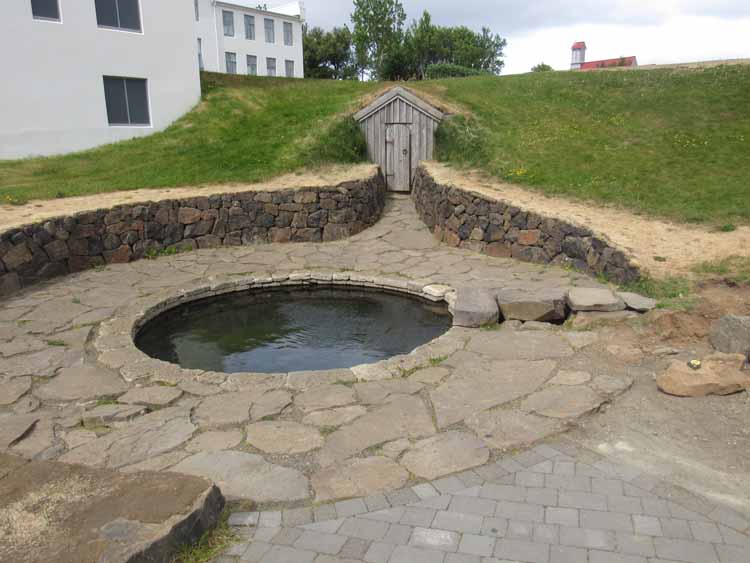Longing for the Hot Tub
by wjw on September 25, 2019
 This morning I went back to town to have 23 staples removed from my hip— remarkably painlessly, I should add. I am hoping the staple removal will serve to accelerate healing and mobility. I am now walking mostly with a cane.
This morning I went back to town to have 23 staples removed from my hip— remarkably painlessly, I should add. I am hoping the staple removal will serve to accelerate healing and mobility. I am now walking mostly with a cane.
I’m still not allowed to use the hot tub, or in fact any tub. I long for a hot tub beyond all reason.
The hot tub in this photo is in Iceland, and was built by the great 13th Century poet and historian Snorri Sturluson, author of The Prose Edda and Heimskringla. (A history of the kings of Norway. Norwegians wouldn’t know their own history if Snorri hadn’t written it down for them.) Snorri is also believed to have written Egil’s Saga, though the attribution isn’t 100%.
Snorri also seems to have invented hot tubs. (Or reinvented them, since the Romans had them.) He noticed a hot spring a distance from his house and constructed a pipeline of hollowed-out logs to this neatly laid-out bath. The door opens to an underground tunnel that led to Snorri’s house, which was more or less where the white modern house is now.
Snorri was also murdered in that tunnel. He was a powerful politician in a period in which politicians’ behavior resembled that of Mafia dons, and one of his rivals sent a 70-man hit squad to attack Snorri’s house at night. Snorri was in the process of escaping via his secret tunnel when he was killed by a henchman named Arni the Bitter, who was himself murdered a dozen or so years later.
Snorri’s bath was quite inviting and I was tempted to disrobe and jump in, but not knowing local laws about defacing historical monuments, I managed to overcome the impulse and moved on.
 This morning I went back to town to have 23 staples removed from my hip— remarkably painlessly, I should add. I am hoping the staple removal will serve to accelerate healing and mobility. I am now walking mostly with a cane.
This morning I went back to town to have 23 staples removed from my hip— remarkably painlessly, I should add. I am hoping the staple removal will serve to accelerate healing and mobility. I am now walking mostly with a cane.
Arni the Bitter… what an apt name! Did anyone call him that to his face?
He called himself that, apparently, at least during the few lines of dialog he’s given in the sagas. (Which, of course, he may never have said.)
What I remember about Snorri is a translation by Borges of the famous anecdote told by Snorri in which a lone man rode out from the English side to the Norwegian forces before the battle of Stamford Bridge and asked for parley. I think this dates from Borges’ time in Texas, when he was studying Old Norse; but I have to warn you that Borges’ version is not in close agreement with most scholars (you can aversion in Wikipedia that is doubtless more accurate but not nearly so fine.)
I don’t have the source to hand, but in paraphrase Borges runs something like this:
Man: The King would like the Earl Tostig to know that if he should leave off this unlawful war and return to loyal service, the King will give a third part of the kingdom.
Tostig: And my friend, Harald Sigurdsson? What does the king offer him?
Man: The king will give him six feet of English sod, and since he is so tall, one more. [he then rides away]
Sigurdsson: Who was that man who spoke so well?
Tostig: Harald Godwinson.
Now, you can see that Borges’ version has a beautiful economy; the offer of a third to Tostig suggests the possibility that Sigurdsson might also get a third, and the threat of death is purely allusive. Tostig remains loyal to his foreign ally; but he retains enough duty of kinship not to betray his brother. In fact, Borges’ point in rendering this passage is to criticize Carlyle for spoiling “the economy” of “six feet of English sod” with “the unfortunate addition” of “for a grave.”
aversion -> find a version. Freudian slip.
Glad to hear you’re recovering even if the pace isn’t quite what one would hope.
I wasn’t familiar with Snorri, or the stories about him, or his hot tub, but I’m constantly amazed at just how horribly wrong our mainstream perceptions of medieval life are.
“Norwegians wouldn’t know their own history if Snorri hadn’t written it down for them.”
… a fact that Icelanders never tire of pointing out to us…
Oh well!
Phil>> of course the saga featuring the Battle of Stamford Bridge was written three or more centuries after the event, and there were very few Norwegian survivors to tell what happened, and all the sources contradict each other. So the “six feet of English earth” story is probably a poetic conceit, though we may wish it were true.
If you’d jumped in, you would have increased the hot tub’s historical significance. “Walter Jon Williams and some old politician who wrote some stuff soaked here!”
Probably would’ve gotten a knighthood or something.
Comments on this entry are closed.